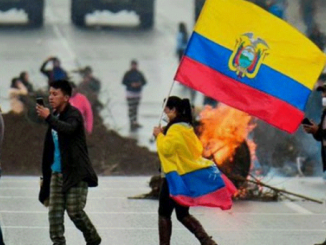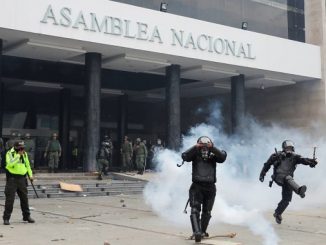
He also issued a material reparation due to the suspension of the radio, which was off air for more than 15 days.
Judge Mario Cadena accepted the protection measure in favor of Pichincha Universal radio station. The authority acknowledged that there was a violation of the right to freedom of expression when suspending activities by the Telecommunications Regulation and Control Agency (Arcotel). This entity and the State Attorney General’s Office (PGE) will appeal this decision.
Pichincha Universal’s defense argued that there was a violation of two constitutional rights. “Rights violated by Arcotel at the beginning of an administrative sanction process without adequate motivation, based on mere affirmations of a Defense Ministry’s statement where it makes a disproportionate analysis of the consequences that the country supposedly lived from an interview,” Pichincha Universal’s lawyer Cristian Perez said.
He said that this decision violated the right to freedom of expression because the suspension of radio activities was ordered on October 9 until 25. The lawyer explained that this action was an attempt against freedom of expression, just as people were limited in their right to information.
Arcotel’s Executive Director Ricardo Freire said that the decision adopted was not precipitated because the measure was taken on October 9, after the aforementioned interview which is the origin of the administrative process against the Radio.
In addition, he mentioned that the suspension “was to prevent the group as a whole from harming themselves (…) What Arcotel has done is to preserve Ecuadorians’ security.”
Adoracion Guaman from the Center for Economic and Social Rights (CDES) presented an “Amicus Curiae,” in which she argued that the suspension of ARCOTEL was “of immediate effect and with irreversible damage to human rights,” including freedom of expression and information.
She mentioned several international treaties that ratify this right and recalled that the Special Rapporteurship for Freedom of Expression of the Inter-American Commission on Human Rights (IACHR) expressed “its huge concern” over the closure of Pichincha Universal that could constitute a censorship act.
Defense Ministry also presented an “Amicus Curiae.” His representative, Maria Belen Andrade defended the right to national security over the right to freedom of expression. She said that “declarations can promote that expressing emotions trigger violence acts that threaten national security.”
The judge finally recognized the violation of due process and freedom of expression with the suspension of Pichincha Universal radio by Arcotel. And due to the days that the radio signal was suspended, the authority ruled a material reparation for the damages caused to the workers of this media outlet.




Be the first to comment